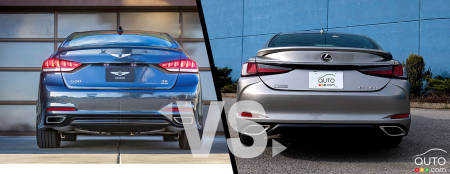Let’s not belabour any points regarding the dominance of German cars in the luxury sedan market. They have ruled for decades in that segment and continue to do so. But there are other models that are very suitable for people who want another alternative or who want to enjoy a certain luxury without showing it off too much.
Here are two of them. And while Genesis is a relatively new player in this segment, Lexus has been weaving its way into the luxury boys’ club for the last 30 years.
Auto123 launches Shopicar! All new makes and models and all current promotions.
2019 Genesis G80
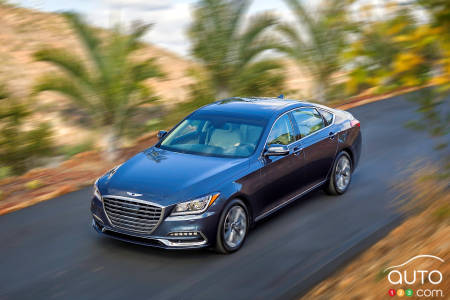
The Genesis G80 was Hyundai's first venture into the luxury car segment. The 2019 edition is the second generation of a car that started life as the Hyundai Genesis, before the Korean automaker made of it a distinct premium brand.
Sitting in the middle of the Genesis lineup, between the compact G70 and the full-size G90, the G80's design goes back to 2015 with the second-generation Hyundai Genesis sedan. Since then, Genesis has made minor style changes and added a Sport Turbo model, but the basics of the car are the same. There are no major updates for 2019.
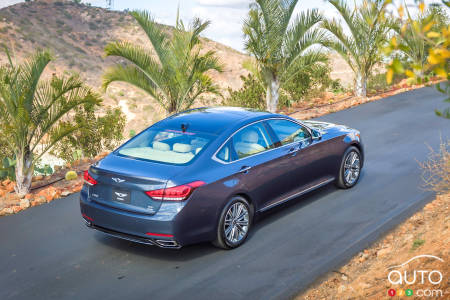
Three engines
The G80 3.8 model is named after its 3.8L V6 that produces 311 hp and 293 lb-ft of torque. The G80 Sport switches to a 3.3L turbo V6 developing 365 hp and 376 lb-ft. Above both of them is the 5.0 Ultimate G80, which gets a 5.0L V8 making 420 hp and 383 lb-ft. The three engines are associated with an 8-speed automatic transmission and all-wheel drive.
The arrival of the Sport turbo and its more-modern engine gave the model an additional argument as it attempts to take on the well-established sedans in the segment. The 3.8L V6 is powerful, but fuel consumption is relatively high and the engine is starting to show its age.
Well-appointed
The G80 lineup starts with the 3.8 Luxury, which comes with 18-inch wheels, panoramic sunroof, 8.0-inch touchscreen with navigation and Apple CarPlay and Android Auto integration.
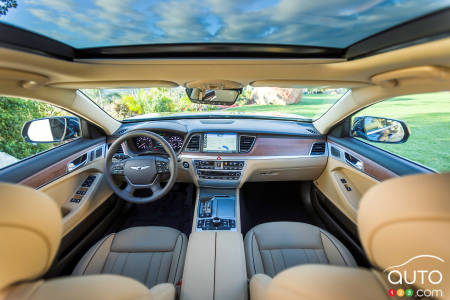
You also get blind spot monitoring with rear cross traffic alert, lane departure warning, collision warning with automatic braking and pedestrian detection, adaptive cruise control, nappa leather upholstery, 900-watt, 14-speaker audio system, heated steering wheel, heated front and rear seats, ventilated front seats and HID headlights.
The Technology model incorporates a multi-view outdoor camera system, wireless cellular charging, head-up display, 9.2-inch touch screen display, 17-speaker stereo system, 7-inch LCD display and an power opening trunk.
The G80 Sport is equipped with 19-inch wheels, various exterior accessories, adaptive suspensions, carbon fiber interior trim, sport steering wheel and adaptive LED headlights.
Finally, the G80 5.0 Ultimate adds a continuous damping control suspension, a micro-suede headliner, a power-operated rear window sunshade and a proximity key.
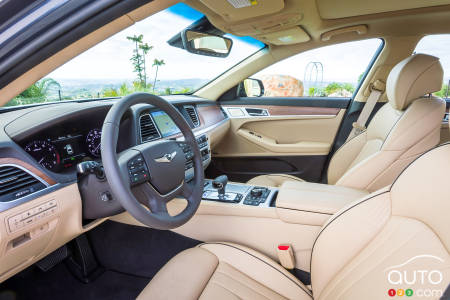
Comfort first and foremost
On the road, in addition to its comfort and quietness, you can’t help but be seduced by the generous space, but its behavior remains conservative and it’s precisely for this reason that it can’t compete with the German models. Its weight, exceeding 2,100 kg, is also a factor. However, there’s a lot of equipment included for the quite reasonable price point and the warranty is solid. For many buyers, these are powerful selling points.
2019 Lexus ES
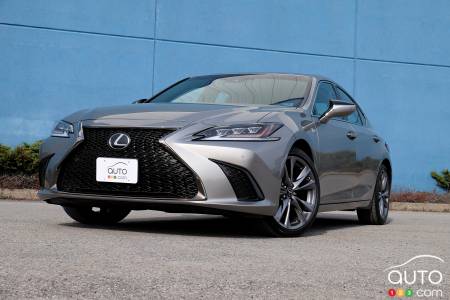
Lexus has earned a reputation for being the preferred luxury car brand of senior citizens, but Toyota is working hard to change that perception. For 2019, like the Camry, with which the ES shares its architecture, the ES arrived at dealerships with a more daring style and the very first F Sport options of this model, which promise more driving adrenaline than the current version.
As always, the lineup starts with the ES 350, equipped for 2019 with a new version of the Lexus 3.5L V6 engine, which gains 34 hp and 19 lb.-ft. of torque for 302 hp and 267 lb-ft of torque. Another novelty: an 8-speed automatic transmission driving the front wheels. An ES 300h hybrid model returns, but with the addition of 15 hp from the combination of a 2.5L 4-cylinder engine and an electric motor, for a total of 176 hp.
The new design also brings the very first F Sport option to the ES 350, which includes an adaptive suspension that responds to an expanded drive mode selector that now features a Sport+ mode.
Changing perceptions
They say Rome wasn’t built in a day, and so it will take time for this new more-dynamic approach at Lexus to lure over Audi, BMW and Mercedes-Benz owners. But they had to start somewhere, and so they have. Motorists who appreciate the extreme ride comfort and the brand’s reputation for rock-solid reliability will be well-served.
Standard equipment for the base gasoline-powered and hybrid models includes a digital gauge, Lexus LFA-inspired drive mode selector and 10-speaker audio system.
The Premium package includes navigation, a heated steering wheel, a 12.3-inch screen audio system and a blind spot monitor with rear cross traffic alert.
For the Luxury package, add triple directional LED headlights, leather seats and wireless cellular charging.
The Ultra Luxury version includes noise-canceling tires, 17-speaker audio system, power-opening trunk, 10-inch head-up display and 360-degree outdoor camera system.
A sportier version
The F Sport (seen in our photos) is positioned as an individual model. It includes the Sport+ drive mode and adaptive suspension as well as blind spot monitor, rain sensitive wipers, rear spoiler, active noise control and 19-inch wheels. The F Sport 2 upgrade (because yes there’s more) adds navigation, 12.3-inch display, head-up display and triple LED headlights.
A monument of reliability since its beginnings, the ES now sees Lexus’ engineers deliver improved dynamism behind the wheel. This F-Sport version isn’t in the same ballpark as the AMG, M or RS models from Mercedes-Benz, BMW and Audi, respectively, but it's a first step. Like the Genesis, it’s still not screamingly sporty, but it's really comfortable and really reliable.

Advantage Genesis G80
Given our harsh winters, the AWD system is a definite plus versus the Lexus ES’ front-wheel drive system. We should also mention the superior warranty, and for those looking for a little more ostentatious luxury there’s the V8 engine, not to be found in the ES product offering.
Advantage Lexus ES
There’s only a hybrid version on the Lexus side of the ledger. Also worth noting is the overall quality of the Lexus, with its more refined fit and finish. It also will deliver a higher resale value, and then there’s that reliability. A big argument is also the price of the ES, substantially lower than that of the G80.
Similarities
In both cases, the focus is on comfort and a quiet ride instead of driving dynamics. You also have very generous space inside each, and a price point that’s lower than the German competition.
Verdict
We give Genesis an A for Effort and salute the student taking its first steps in this arena. When you look in-depth at the models, however, it becomes obvious that Lexus’ decades of experience in the domain brings the ES more substance in terms of the drive, the finishing and a host of other small details. Its more affordable price will also be a determining factor for many people.
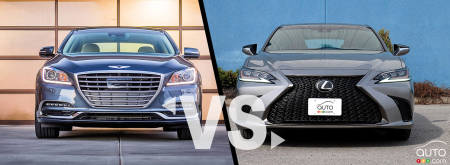
2019 Genesis G80
We like
Comfort
Generous space in the cockpit
V6 turbo engine
We like less
Styling
Overweight
Brand image to develop
2019 Lexus ES
We like
More-inspired lines
Rigid chassis
Quiet cabin
We like less
Useless touch pad
Android Auto not available
A 4WD model would be a good idea

| ... | |||
| Specifications | |||
| 2019 Genesis G80 | 2019 Lexus ES | ||
| Transmission | 8-spd auto | 8-spd auto or CVT | |
| Drivetrain | AWD | FWD | |
| 3.8 L | Hybrid | ||
| Fuel consumption (city) | 13.4L/100 km | 5.8L/100 km | |
| Fuel consumption (highway) | 9.6L/100 km | 6.1L/100 km | |
| 3.3 L T | 3.5 L | ||
| Fuel consumption (city) | 13.8L/100 km | 11.4L/100 km | |
| Fuel consumption (highway) | 9.7L/100 km | 7.7L/100 km | |
| 5.0 L | |||
| Fuel consumption (city) | 15.6L/100 km | ||
| Fuel consumption (highway) | 10.4L/100 km | ||
| Engine | |||
| Type | Gas | Hybrid | |
| Power | 311 hp | 215 hp | |
| Torque | 293 lb-ft | 163 lb-ft | |
| Cylinders | 6 | 4 | |
| Displacement | 3.8 L | 2.5 L | |
| Type | Gas | Gas | |
| Power | 365 hp | 302 hp | |
| Torque | 376 lb-ft | 267 lb-ft | |
| Cylinders | 6 | 6 | |
| Displacement | 3.3 L T | 3.5 L | |
| Type | Gas | ||
| Power | 420 hp | ||
| Torque | 383 lb-ft | ||
| Cylinders | 8 | ||
| Displacement | 5.0 L | ||
| Capacity | |||
| Cargo space | 433 L | n/d | |
| Fuel tank | 77 L | 60 L (V6) 50 L (hybrid) | |
| Dimensions | |||
| Length | 4990 mm | 4975 mm | |
| Width | 1890 mm | 1865 mm | |
| Height | 1480 mm | 1445 mm | |
| Wheelbase | 3010 mm | 2870 mm | |
| Warranty | 5 yrs/100,000 km | 4 yrs/80,000 km | |
| Price | $58,000 to $65,000 | $45,000 to $47,000 |
